Ayurveda- with Emma Cust
- Alison Turner
- Feb 22, 2023
- 13 min read
Updated: May 25, 2023
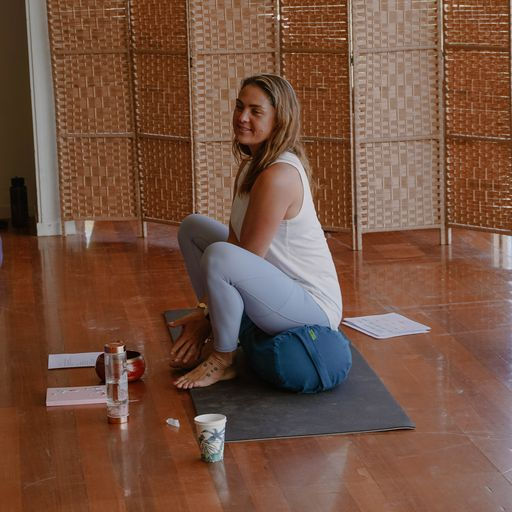
Ayurveda, meaning ‘the science of life’ in the traditional language of Sanskrit, is a holistic health system that encompasses just that.
From the beginning, the practice has been popular in India, and has now slowly transitioned over to the West. A health system built on the basis of listening to our own bodies, the teachings are as relative as they are interesting.
Like life itself, Ayurveda is multifaceted- ‘it’s a lot of information, but it’s simple’. ‘It’s a huge healing system’ which ‘focuses on physical, mental, emotional, social and spiritual well-being’. ’It is that and more’, adds Emma.
Emma Cust is an Ayurvedic wellness coach. ‘Not one size fits all’ is her belief, so each client is treated thoroughly and individually, covering all bases from sleep to trauma, relationships to diet.
Despite being the world’s longest natural healing system still practiced, the term ‘Ayurveda’ might not spark an image to you. Perhaps these practices do though; yoga, meditation, journaling. Most wellness methods have originated from the Indian born practice, based around the ‘seasonal, ritualistic, and intuitive’ cycles of mother nature and self. With Emma's wisdom, this piece has been put together to provide understanding into the practices that formulate our society.

Intuition- ‘the ability to understand something instinctively, without the need for conscious reasoning’
Ayurveda helps unlock the information you’ve spent accumulating over your many years of life, through the vessel of intuition. As foreign as Ayurveda may sound, many elements of the system have been instilled in us from birth; sayings like ‘trust your gut’ or ‘what is your heart telling you?’ relate directly to the art of intuition.
‘Sometimes we feel, and we don’t know the knowledge behind it’. Those moments where we have a hunch that something is wrong, thinking of an old friend and hearing your phone suddenly ‘buzz’ with a text from them, turning left instead of right for no apparent reason only to find something better that way.

Ayurveda states that there is a reason, and that reason is intuition.
Kids and animals are notorious for naturally having strong intuition, Ayurveda aims to rebuild that in us as adults. 'We don’t need someone else to tell us how we should look or feel or act or do. That knowledge of who we are is right inside us’. ‘We have to unlock and open up our intuition’.
So how exactly do we do that? Well, the answer is simple; nurturing and listening to our bodies.
‘Ayurveda is built on mother nature’, and mothering ourselves. Like a mother should to a child, our bodies need to be continually nurtured as we get older; ‘your cleansing’, 'tongue scraping’, ‘meditation’, ‘journalling’, ‘seeing a therapist’, 'putting up boundaries' over who you see. The more trust and love we reinstall in to ourselves, the more ‘retuned’ we become with our intuition.
Feminine/Masculine Energy
In Ayurvedic belief, actions people exhibit are categorised as either having ‘masculine energy’ or ‘feminine energy’. What creates the distinction between energies?
‘The masculine energy is ‘on’, it’s thinking, it’s left side of the brain, really active.’ Emma passionately explains. ‘Feminine is a bit more withdrawn’, for example, spending time with yourself . 'Feminine is more slow and flow’.
Feminine Energy: | Masculine Energy: |
yoga | running |
meditation | socialising |
swimming | lifting weights |
body care | planning |
listening | talking |
creation | logic |
intuition | competition |
nurturing | structure |
warmth | adventure |
‘We are living in a masculine world’.
The attributes that fall under masculine energy have become overly prevalent in our society, Emma believes. In regards to long work weeks and demanding expectations; 'we’ve lost a lot of that nurturing, that slowing down, that being able to rest, to look after ourselves and not feel guilty'. 'It's important to everyone, we all need to rest.'
How would the world spin if it was all rest? That's where the balance comes in. 'We need that masculine energy to get stuff done or else we’d probably just fluff around', 'but we’ve gone too far the other way now. Everything is just deadlines, to be 'on' all the time, to be available all the time’.
The emphasis on balance is a common theme within ayurveda, and the balance of masculine and feminine energy in each individual is part of what creates optimal health. ‘We always strive for balance and equilibrium’.

Does balance mean each person needs an equal amount of masculine and feminine energy? According to Emma, 'not exactly'.
‘It’s about balance, but probably not the same amount. Women need more feminine energy because that’s what they need to thrive, men need more masculine because that’s what they need to thrive, but they still need the feminine', just as women still need the masculine.
To combat what Emma describes as a 'masculine world', '(men) might still need 30% more femininity, where as women probably need 70% more femininity’. ‘Men have a feminine side that’s not being nurtured enough’.
When our bodies receive the amount of energy we need to thrive, that outcome should be 'feeling good all the time, or as much of the time as you can.' 'You want to be feeling joy, abundance, at ease, and flow. That means you’re in balance and you’re at an equilibrium’.
And out of balance?
‘If you’re starting to feel pain, stress, tiredness, aching, or you’re not sleeping, all these symptoms are showing you that you’re really out of alignment and balance’.
Life is never perfect constantly, but being consciously aware of the affects our actions have on our bodies is not only an Ayurvedic skill, it's a life skill.
Is Ayurveda for you?

Is there a certain demographic for ayurveda? Emma says no, that it only depends on ‘where people are it with their wellbeing and their openness’.
When speaking of Emma's cliental, ‘you’ve got the people that are looking for something more than what’s right in front of them, something new’. ‘They genuinely want health, vitality, higher connection, more connection, more
intuition’.
‘It’s not specifically age’ - Emma had a spread of generations, from eighteen to sixty-five, at her most recent ayurveda/yoga workshop, however, notably only female attendees.
‘I don’t want to tarnish anyone, but I feel like women are more intuitive or more open’. ‘They’ve got questions like ‘who am I?’ ‘What am I meant to be doing?’ ‘What else is out there?’. 'That kind of knowledge and warmth and energy slowly starts to filter out.'
Ayurvedic practices do not start and stop with women. Emma smiles proudly when she discusses her children, who mimic their mum's self-care practices, and her husband admitting that tongue cleaning actually does make a difference for him- although he still refers to Emma jokingly as a 'witch doctor'.
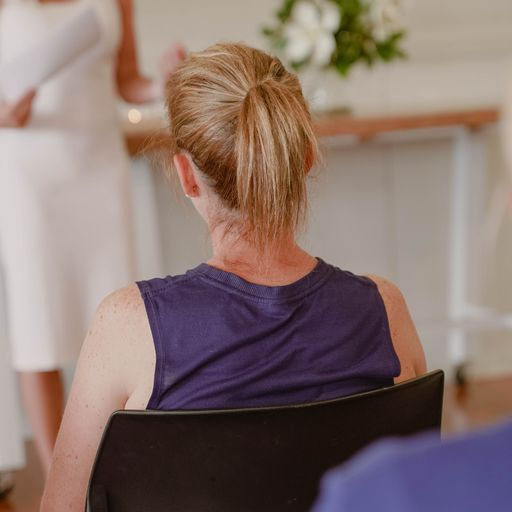
'That’s one of the beautiful things, you can affect more people indirectly by reaching the women in the household’.
‘The women are the heart of a home. Through the women, the changes happen’.
Finding Purpose
As a true blue Aussie, how has an Indian practice found purpose in Emma’s life? The surprising answer- Instagram! Laughing, Emma explains; ‘an ad popped up for ‘Shatki school’. I listened to the video and it was like ‘are you wondering what your life purpose is? Are you lost? Are you feeling like you need to reconnect with mother earth?’ It just really resonated with me and I hit ‘bang’ and signed up’. ‘There was no doubt, I just knew it was right.’
The pathway prior to finding ayurveda has been a rocky one for Emma. Emma was six weeks pregnant with her youngest son when her dad tragically passed away. ‘Losing dad, then being at the end of having kids, I just lost that identity and didn’t know who I was’.
'I was looking for something and felt like my path was changing. I was on a journey for a deeper understanding of who I was and why I’m here’. ‘Sometimes we have a life purpose and sometimes that shifts and evolves as we do’.
When wearing many hats, the person underneath the brim can get lost in it all. As a 'stressed out' mum, a 'grieving daughter', a wife and a business owner, Emma was looking for 'deeper connection with self and the universe'. Thank you Instagram; 'that’s what got delivered to me that day’.
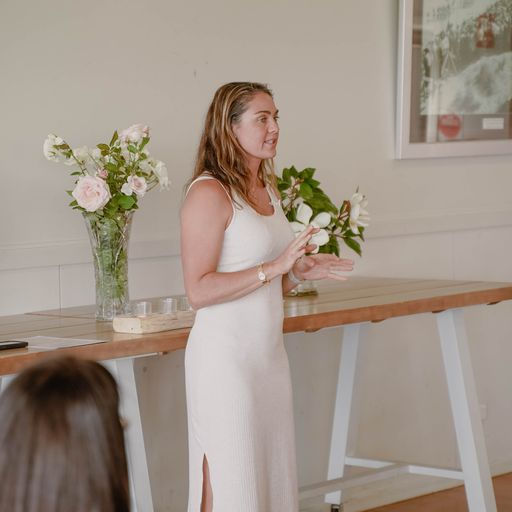
Through ayurveda, Emma has found her ‘life purpose’;
‘I definitely think I’m here to help people and here to heal people. I think I’m here to help unlock higher purpose in everyone else, unlock their potential basically. To use ayurveda to bring them into balance so that they can then flourish’.
Besides working one-on-one with clients, Emma also runs Ayurveda workshops, and is in the process of creating an online platform to provide Ayurvedic knowledge to all people, no matter their ability to attend sessions in person.
Emma beams with confidence and attests; 'I’m going the right way', positively adding that this path of hers 'feels good and right'.
Ayurveda plus Science
'The proof is in the pudding’ with any of the Ayurvedic practices - it’s just about being open minded and giving Ayurveda a shot. ‘The fact that science is backing up a lot of this stuff now means there’s no reason to doubt.’
For the people who are ‘a little bit more left-brain operated’, Emma is correct in claiming that elements of ayurveda have been supported by science, with new studies currently progressing.
An interesting study has been completed on energy fields and vibrations, ‘they can back how far sound travels and how far people can feel energy’, excitement radiating in Emma’s tone. Even Albert Einstein himself infamously stated that 'everything in life is a vibration'- sounds and thoughts.
‘There’s all these sciences behind things that you might think ‘oh God, that’s ridiculous’ but you know when you get that feeling that something’s not right or something’s off about that person? (Science) is able to prove it now, which is fascinating and amazing.’
Managing stress is one of the largest outcomes of ayurveda, and the effects of stress are now being recognised within science and western medicine; ’a lot of doctors are seeing now how much stress, emotions and traumas play on disease’. ‘Stress affects the digestive system, it affects your sleep, your mood, hormones, relationship. Stress affects everything’.
Ayurveda is full of many natural remedies. One has been scientifically acclaimed above the rest- ashwaganda.
Ashwaganda is an evergreen shrub that grows in India. The remedy works as an anti-anxiety medication, calming the brain, reducing swelling, lowering blood pressure, and altering the immune system.
Scientific studies on the shrub, usually taken in capsule format, has proven affects with sleep support, boosting fertility, reducing anxiety and increasing attention span.
As for the pieces of ayurveda that haven’t yet been given the tick from science?
Emma has a unique take; ‘if it feels good for you, then who fucken cares?’. ‘We need to shut down that part of the brain that (always) needs to know why this happens’.
‘We’ve got to feel it more, if we feel good and we enjoy it then it doesn’t matter.’ Soul mates, prayers, miracles. . . so much of our world doesn’t make logical sense sense, the illogical is what keeps faith and hope alive.
Ayurveda plus Religion
Ayurveda has paved the way for many eastern religions; Hinduism, Yogi, Buddhism. How how does the system fit into a western society that is predominately Christian and atheist?

Emma is quick to assure that Ayurveda needs no religious ties; ‘I’m not judgmental. I'm not locked on one belief, it’s just that connection that there’s something at work bigger than yourself.' All that is needed is faith and hope.
'I don’t mind who that is or what it is to each person, it’s just having the awareness that the spirits or the universe have got your back.’
'The Gap' in Health Systems
What is western medicine missing that Ayurveda has?
‘You’ve done the intake, it’s twenty one pages’, I interject with a laugh, "front and back!" There’s no denying that thoroughness and individuality are key components of Ayurveda, a technique that Emma believes bridges ‘the gap’ that typical western medicine can leave.

‘We get the whole holistic background’ in contrast to a ‘five minute interview’ in a clinic. ‘You’ve go to get the whole puzzle to work out what pieces are missing’. ‘The level of understanding that ayurveda goes into’, paired with the system’s ‘holistic tools’ assist with ‘getting to the root cause’ of health issues.
‘If somebody is not sleeping, a doctor might give them sleeping pills, where as we would go ‘right, what’s affecting the sleep that we can see and how can we change them?’. ‘It’s more of a natural approach’, ’being able to work out what you need and relying more on yourself rather than somebody else, or a pill’.
When asked if Ayurveda is missing anything that western medicine has, Emma doubtlessly answers, ‘oh 100%’.
‘Western medicine is always going to have a place’, 'there’s no way that it’s ayurveda or the highway’.
Western medicine even has place in Emma’s own home, demonstrating how collaboratively the pair can work together. Sharing part of her private life, Emma retells experiences from the past year regarding the health of her two sons; ‘gosh, I was in the hospital with both my boys last year and they needed to be there. They had stuff going on, serious medical stuff’.
There are important pieces to be taken from both Western and Eastern health systems; ‘it’s complimentary’. When ayurvedic methods aren’t ‘enough’ alone for her clients, Emma is happy to suggest the likes of doctors, therapists, naturapths, and physiotherapists for her clients to receive the care they need. ‘It’s not ayurveda or nothing’, ‘there’s a place for both’.

In relation to mass reliance on pharmaceutical drugs, Emma thinks that ‘it’s time to get back to nature more’. ‘(Doctors) probably don’t want every person at their clinic with everything under the sun, they want the people who are really sick and need their help.’
‘I think sometimes with tablets, once people are on them they feel like they have to be on them for the rest of their life’, ‘and there are those cases where people do need that’, Emma steadily clarifies, but sometimes there are other options worth exploring, and Ayurveda can help find that.
The Change
Along with her cliental who swear by Ayurveda, Emma herself has noticed a huge change. The self care rituals embodied in Ayurveda have helped Emma become a ‘better mother’, a ‘better partner’, and an all round better person from within.
“I know it’s cliche, but you can’t pour from an empty cup”,’ After Emma’s father passed, ‘emotionally and physically’ she felt as if all she was doing was ‘looking after everyone else’. ‘I was trying to make sure my family were alright and my mum was alright, you haven’t got someone pouring all that into you, so I had to do it myself.’ ‘A lot of the self care practices were able to help me nurture myself.’
Whilst having ‘an empty cup', Emma reflects on her struggle to find emotional stability; 'my moods were all over, I felt that I was getting angry at the kids, but it was coming from that point of burnt out, tired.’ ‘I was at 30-35% of my capabilities’.
Through Ayurvedic techniques of ‘more self care’, slowing down and nurturing herself, Emma ‘started to feel a lot better’. ‘I started to get more energy and a lot of little symptoms and issues that I was having started to settle down.’ From that point onwards, prioritising self care continued. ‘It was just that snowball affect of you start to feel good so you want to do more of it’.
Three years onwards, and the gratitude for Ayurveda continues; ‘definitely my moods are better. I’m happier, but also too I’ve got my creative outlet now.’ Ayurveda has assisted Emma in finding what she deems her ‘true purpose’; 'helping other people, but also growing my business.’.
‘By nurturing myself, I’ve calmed down. I’m a better mum, I’m a better friend, I’m more relaxed. My creativity-spiritual side is open, I’ve got that higher intellect.’ ‘I’m living to my higher potential’.

Progressive Concepts in Country Towns
Town dynamics change over the years, and Emma- having grown up in Warrnambool and now raising her own children here- is in a unique position of witnessing that transgression first hand. Speaking on the topic of holistic practices in the South West, Emma notes the large increase over the past ten years.
‘That’s where the internet is both a blessing and a curse, because we’ve got access to everything now.’ ‘It’s allowed those Eastern and different traditions to come overseas, where in the past unless you had someone who physically traveled and brought that information back, you didn’t have it. The further you are away from those metropolitan cities, the longer it takes to funnel it.’
‘Even when I started teaching yoga, there were probably only a handful of teachers’ compared to umpteenth number of yoga studios appearing around town now, the practice is growing. ‘It’s exciting, because now we have access to things we wouldn’t normally stumble upon in a remote country town’. ‘The more things that we can get into the smaller communities and help more people is really good. The more people we can reach.’
With not a hint of insecurity in Emma's tone, it's obvious that spreading the message of Ayurveda is Emma's sole intention. Other holistic businesses in the area aren't viewed as competition. ‘Hopefully it’ll become 'the norm' that everyone can self help, self regulate, look into their intuition a bit more’.
Ayurveda for Breakfast
Situated an odd ten thousand kilometres from the heart of India, what Ayurvedic practices could local Australian readers bring into their homes right now?
According to Emma, Ayurveda is as simple as ‘routines and rituals’, with no need to spend mass amounts of time and money to achieve the results.
‘Start off with one thing at a time, maybe one thing in the morning and at night’, aim to keep that ‘thing’ as consistent as you can to establish the ritual. ‘Whether that’s the self care, more nourishment for your food, starting a spiritual practice or some kind of yoga practice. You just start with one thing that’s achievable for you and in your time frame.’
Emma understands being busy, - ‘I’m a mum of three!’ Ayurveda moulds around you, ‘you might start off with five minutes of journaling every second day and then you might build that up to five minutes everyday the next week and then maybe ten minutes after that’. A little bit of Ayurvedic self care is 'better than nothing'. ‘Keep it achievable and realistic so that it doesn’t become another thing to do’. ‘Once you start to feel good ,you want to do it, and you want to do more of it’
In terms of diet, it’s ‘eating at the same time of day, similar foods, and eating mindfully’. Incorporating foods that are in season, and listening to what your body needs. Foods like dates, almonds, spices and ghee are top tier Ayurvedic recommendations.
For night time, it’s ‘having some kind of wind down ritual before bed, shutting off the phone, shutting off the telly 8-8:30pm’ and beginning the process of relaxing the mind and body. ‘Being busy, you need something to slow you down in the middle before you stop’. Emma draws a comparison to sprinting a race. When your heart is beating fast, legs hurrying and arms pumping, having an immediate ‘stop’ isn’t natural. Our bodies need an orange light, a ritual between the ‘go’ and ‘stop’ to ‘slow everything down’ before we crash.'
‘You need a practice before you go to bed’, for Emma that practice is massaging her feet with magnesium cream each night, other suggestions are; meditation, listening to a relaxing podcast, laying with legs up the wall to ‘slow down the nervous system’, journaling, and reading. All of these notions work to ‘get your body out of ‘flight fight’ business state into the calm, restorative state’.
Recipe for a Well Lived Life
To Emma, the fundamentals of Ayurveda create the recipe for a life well lived;
“Following your intuition, or your guides, to be as happy and healthy as you can with no regrets, reaching your highest potential.”

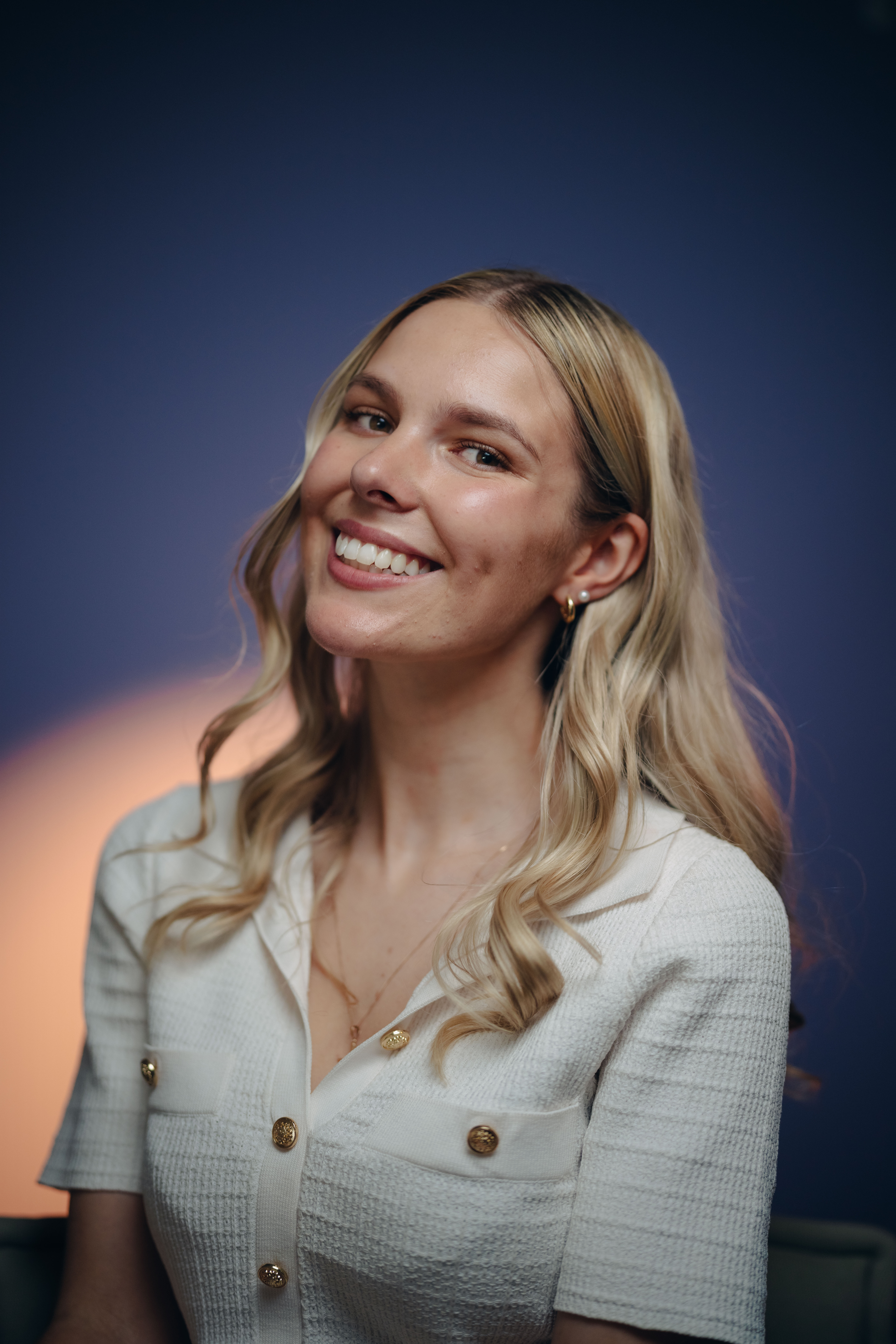

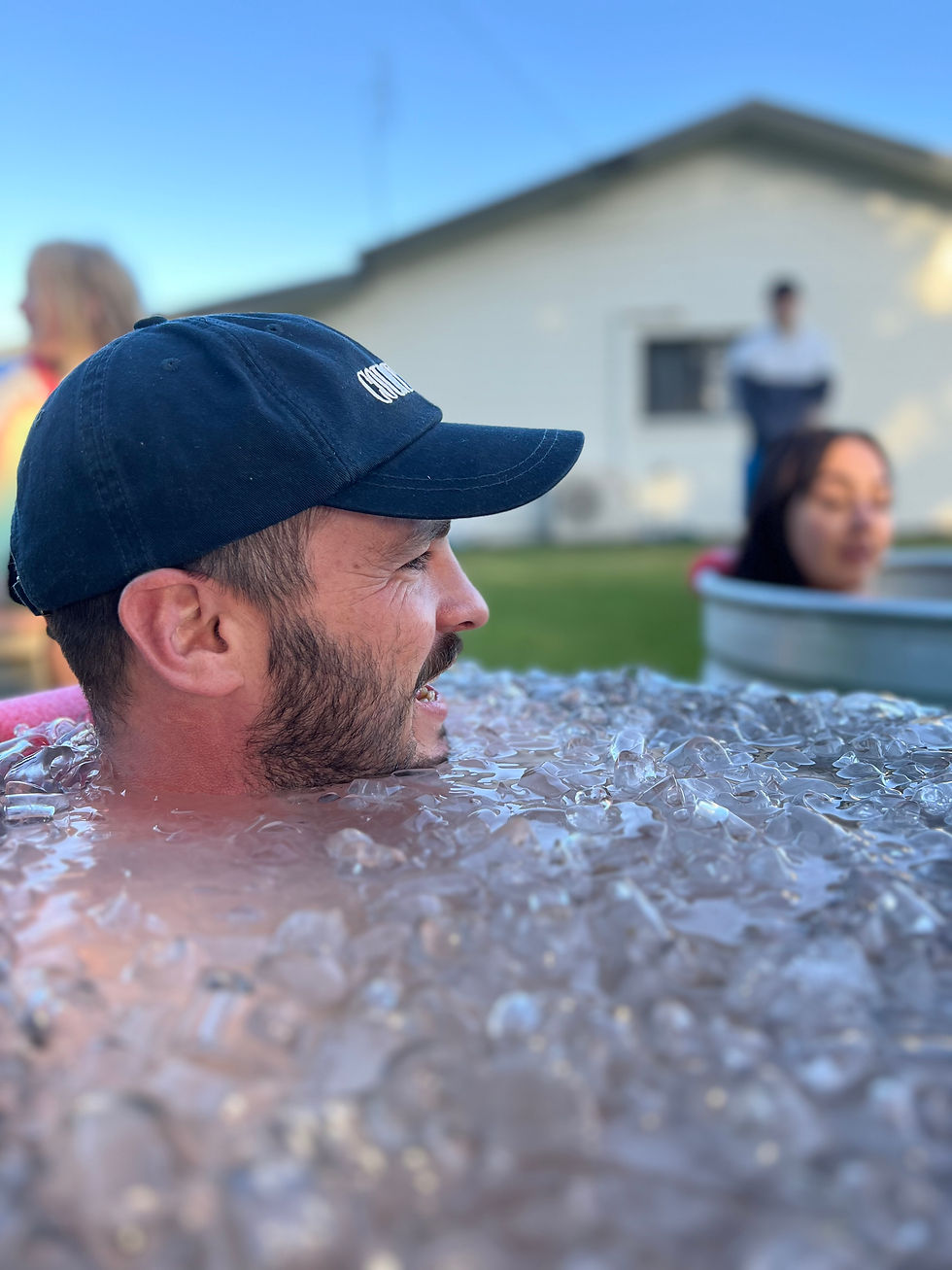
Comments